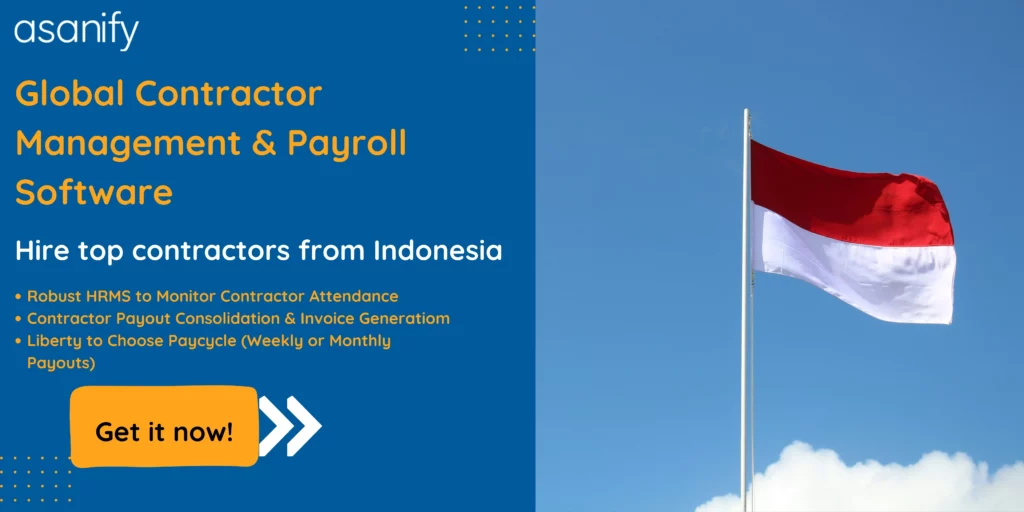Contractors play a crucial role in many industries, offering specialized skills and expertise for short-term projects. If you’re considering hiring contractors, it’s important to understand the specific regulations and requirements involved, including the ways to pay contractors in Indonesia. This comprehensive guide will walk you through the entire process, from identifying independent contractors to paying them and everything in between. Whether you’re a business owner or a project manager, this guide will provide you with the knowledge you need to successfully navigate the contractor landscape in Indonesia.
Contents
- Who is an Independent Contractor in Indonesia?
- How is an independent contractor in Indonesia different from an Employee?
- Penalties for Contractor and Employee misclassification in Indonesia
- What are the Labor Laws in Indonesia?
- Steps to Hire a Contractor in Indonesia
- Important Considerations for Hiring and Managing Contractors in Indonesia
- How to draw up an independent contractor agreement in Indonesia
- Do’s and Don’ts of Designing an Independent Contractor Agreement to Hire and Pay Contractors in Indonesia
- How Payroll Works When You Move Ahead to Pay Contractors in Indonesia
- Tax Filing Requirements for Contractors in Indonesia
- Tax Compliance for US-based Companies
- Minimum Wages for Contractors in Indonesia
- Best Ways to Pay Contractors in Indonesia
- Currency and Other Considerations to Pay Contractors in Indonesia
- Tax and Other Payroll Costs for Contractors in Indonesia
- Termination or extension terms for independent contractors in Indonesia
- How to Convert an Independent Contractor in Indonesia to an Employee?
- Quick Wrap Up
- Frequently Asked Questions
Who is an Independent Contractor in Indonesia?
Before diving into the intricacies of hiring and paying contractors in Indonesia, it’s essential to know who qualifies as an independent contractor in the country. Independent contractors are individuals who provide services to a company on a self-employed basis, without being considered employees. This classification is determined by the nature of the work relationship and various factors such as control, payment methods, and contractual agreements.
In Indonesia, independent contractors play a significant role in the workforce. They encompass a diverse range of professionals, including but not limited to:
Freelancers
These are individuals who offer their skills and expertise on a project basis. They may work in various fields such as graphic design, writing, programming, or consulting. Freelancers often have multiple clients and enjoy the flexibility of choosing their projects.
Consultants
Consultants are experts in a specific field who provide advice and guidance to businesses. They may specialize in areas such as management, finance, marketing, or human resources. Consultants are hired for their expertise and are typically engaged for a specific project or a set period.
Contractual Workers
These individuals enter into fixed-term contracts with companies to fulfill specific roles or responsibilities. They may work in industries such as construction, manufacturing, or hospitality. Contractual workers are not considered employees and are responsible for their own taxes and social security contributions.
Artists and Performers
Indonesia has a vibrant arts and entertainment industry, and many artists and performers work as independent contractors. Musicians, actors, dancers, and other creative professionals often collaborate with different production companies or event organizers on a project basis.
It’s important to note that the classification of independent contractors can vary depending on the specific laws and regulations of each country. In Indonesia, the Ministry of Manpower provides guidelines and criteria to determine the status of an individual as an independent contractor. These guidelines aim to ensure fair treatment and protection for both contractors and employers.
When engaging independent contractors in Indonesia, companies must carefully consider the nature of the work relationship and establish clear contractual agreements. This includes defining the scope of work, payment terms, and any additional benefits or obligations. By understanding the definition and scope of independent contractors in Indonesia, businesses can navigate the legal and operational aspects of engaging contractors effectively.
Suggested Read: Pay Contractors in Ukraine- A Comprehensive Guide to Hiring
How is an Independent Contractor in Indonesia different from an Employee?
In Indonesia, there are distinct differences between independent contractors and employees. Employees are subject to labor laws, receive benefits, and have a more substantial degree of control and direction from their employers. On the other hand, independent contractors have greater control over their work and are responsible for their own taxes, insurance, and contractual arrangements. Understanding these differences is crucial for avoiding misclassification, which can lead to legal ramifications.
1. Labor Law Protection
When it comes to labor laws, employees in Indonesia are protected by various regulations that ensure fair treatment and provide benefits such as paid leave, social security, and health insurance. These laws also govern working hours, overtime pay, and termination procedures. Employers have a legal obligation to comply with these laws and provide a safe and healthy working environment for their employees.
Independent contractors, on the other hand, are not covered by the same labor laws as employees. They are considered self-employed individuals who enter into a contractual agreement with a client or company to provide specific services. As independent contractors, they have more flexibility in terms of working hours and the ability to choose their clients and projects. However, they are responsible for their own taxes, including income tax and value-added tax (VAT), and must make their own arrangements for health insurance and other benefits.
2. Level of Control
Another significant difference between employees and independent contractors in Indonesia is the level of control and direction exerted by the employer. Employees typically work under the direct supervision and guidance of their employers, who have the authority to assign tasks, set deadlines, and provide instructions. Employers also have the power to evaluate employee performance and take disciplinary action if necessary.
Independent contractors, on the other hand, have more autonomy and control over their work. They are hired to complete a specific project or provide a particular service, but the client or company generally does not have the same level of control over how the work is done. Independent contractors are expected to deliver the agreed-upon results within the agreed-upon timeframe, but they have more freedom to determine their own methods and approaches.
It is important for both employers and independent contractors to understand these distinctions to avoid misclassification. Misclassifying an employee as an independent contractor or vice versa can have serious legal consequences. Employers who misclassify employees may be liable for unpaid wages, benefits, and penalties, while independent contractors who are misclassified may miss out on important protections and benefits afforded to employees.
In conclusion, the differences between independent contractors and employees in Indonesia are significant. Employees enjoy the protection of labor laws, receive benefits, and have a higher degree of control and direction from their employers. Independent contractors, on the other hand, have more autonomy and responsibility for their own taxes and contractual arrangements. Understanding these differences is crucial for both employers and independent contractors to ensure compliance with the law and avoid potential legal issues.
Also Read: Pay Contractors in Switzerland- A Comprehensive Guide to Hiring
Penalties for Contractor and Employee Misclassification in Indonesia
Misclassifying contractors as employees or vice versa carries significant repercussions in Indonesia. Employers can face fines, legal disputes, and potential claims for unpaid benefits or taxes. It’s essential to correctly classify workers from the outset to avoid these penalties and maintain compliance with Indonesian labor laws.
When it comes to contractor and employee misclassification, the Indonesian government takes a firm stance. The classification of workers is crucial as it determines their rights, benefits, and obligations under the law. Misclassifying workers can lead to serious consequences for both employers and employees.
1. Imposition of Fines
One of the primary penalties for misclassification is the imposition of fines. The Indonesian government has established strict penalties to deter employers from misclassifying workers. These fines can vary depending on the severity of the misclassification and the number of affected workers. Employers found guilty of misclassification may be required to pay substantial fines, which can have a significant impact on their financial stability.
2. Legal Disputes
Misclassification can also result in legal disputes. Workers who believe they have been misclassified may file complaints or lawsuits against their employers. These legal disputes can be time-consuming and costly for both parties involved. Employers may have to bear the expenses of legal representation and potential settlement payments if found liable for misclassification.
3. Claims for Unpaid Benefits and Taxes
Worker misclassification can lead to potential claims for unpaid benefits or taxes. When workers are misclassified, they may be denied certain benefits and entitlements that are typically provided to employees. This can include paid leave, health insurance, social security contributions, and other benefits mandated by Indonesian labor laws. If workers discover that they have been misclassified, they may seek compensation for the unpaid benefits they should have received.
Employers who misclassify workers may also face claims for unpaid taxes. In Indonesia, employers are responsible for deducting and remitting taxes on behalf of their employees. However, if workers are misclassified as contractors, employers may fail to fulfill their tax obligations. This can lead to tax liabilities for both the employer and the misclassified workers, as well as potential penalties from the tax authorities.
To avoid these penalties and maintain compliance with Indonesian labor laws, employers should ensure proper classification of workers from the outset. It is crucial to understand the criteria used to differentiate between contractors and employees and apply them accurately. Seeking legal advice or consulting with labor law experts can help employers navigate the complexities of worker classification and ensure compliance with the law.
Also, Check Out: Employee Misclassification Guide- The Key to Avoiding Hefty Penalties
What are the Labor Laws in Indonesia?
Labor laws in Indonesia cover various aspects for both employees and contractors.
For Employees
1. Employment Contracts
Indonesian labor law requires written employment contracts specifying terms and conditions, such as job description, salary, working hours, and benefits.
2. Working Hours
The standard working hours are 40 hours per week, typically spread over five working days. Overtime is regulated, and employers must compensate employees accordingly.
3. Minimum Wage
Indonesia sets minimum wage levels based on regions and sectors. Employers are obligated to pay at least the minimum wage to their employees. The provincial minimum monthly wage in Indonesia varies from Rupiah 1,958,169 (US $126) to Rupiah 4,901,798 (US $316). This rate varies from one state to another.
4. Leave and Holidays
Employees are entitled to annual leave, public holidays, and other types of leave like sick leave and maternity/paternity leave, with specific regulations governing each. Usually, the quantum of paid annual leave is 12 days and that of annual public holidays is 15.
5. Probation Period
As per Article 60 of the Employment Law, the standard probation period in Indonesia is of three months. Employees ought to receive equal or above the minimum wage during the probationary period.
6. Termination
Termination procedures are regulated, and employers must follow specific guidelines to terminate an employee. Unfair dismissal is not allowed.
7. Social Security
Employers are required to contribute to social security programs covering healthcare, workplace accidents, and pension for their employees.
For Contractors
1. Contractual Agreements
Contractors are typically engaged through service agreements or contracts specifying the scope of work, duration, and compensation terms.
2. Taxation
Contractors are responsible for their own taxes, and employers are not required to provide benefits such as health insurance or social security.
3. Independence
Contractors are considered independent entities, and the relationship with the hiring company is generally less rigid than that of an employer-employee relationship.
4. No Employment Benefits
Contractors usually do not receive employment benefits like paid leave, overtime pay, or severance pay.
5. Project-Based Work
Contractors are often engaged for specific projects or tasks, and their engagement ends upon completion of the project or task outlined in the contract.
It’s essential for both employers and contractors to adhere to these regulations to ensure fair and legal employment practices in Indonesia. Keep in mind that labor laws may be subject to updates, so it’s advisable to consult with legal professionals or government authorities for the latest information.
Steps to Hire a Contractor in Indonesia
When hiring a contractor in Indonesia, it’s important to follow a structured process to ensure legal compliance and achieve a successful working arrangement. These steps include determining the project scope, identifying suitable candidates, negotiating and finalizing the contract, and clarifying the terms and conditions of the engagement. By carefully following these steps, you can establish a solid foundation for a productive contractor relationship.
Step 1: Determining the Project Scope
Before hiring a contractor in Indonesia, it’s crucial to clearly define the scope of your project. This involves identifying the specific tasks and deliverables that need to be completed, as well as any budgetary or timeline constraints. By having a well-defined project scope, you can effectively communicate your expectations to potential contractors and ensure that everyone is on the same page.
Step 2: Identifying Suitable Candidates
Once you have determined the project scope, it’s time to start looking for suitable candidates. In Indonesia, there are several ways to find contractors, including through referrals, online platforms, and professional networks. Take the time to research and evaluate potential candidates based on their experience, qualifications, and reputation. It’s also important to consider their availability and whether they have the necessary permits and licenses to work in Indonesia.
Step 3: Negotiating and Finalizing the Contract
After identifying potential candidates, it’s essential to negotiate and finalize the contract. This involves discussing the scope of work, pricing, payment terms, and any other relevant details. It’s important to clearly outline the responsibilities and expectations of both parties to avoid any misunderstandings or disputes later on. Seek legal advice if necessary to ensure that the contract complies with Indonesian laws and regulations.
Step 4: Clarifying the Terms and Conditions of the Engagement
Once the contract is finalized, it’s crucial to clarify the terms and conditions of the engagement with the contractor. This includes discussing the project timeline, communication channels, reporting requirements, and any other specific details that are relevant to the project. By establishing clear guidelines and expectations, you can minimize the risk of miscommunication and ensure a smooth working relationship.
In conclusion, hiring a contractor in Indonesia requires a structured approach to ensure legal compliance and a successful working arrangement. By following the steps outlined above, you can navigate the hiring process with confidence and establish a solid foundation for a productive contractor relationship.
Important Considerations to Hire, Manage, and Pay Contractors in Indonesia
While contractors offer flexibility and specialized skills, there are essential considerations when hiring and managing them in Indonesia. It’s crucial to clearly define the project scope, establish transparent communication channels, and regularly evaluate performance. Additionally, understanding intellectual property rights, confidentiality agreements, and dispute resolution mechanisms will help protect your rights as well as foster a positive working environment.
1. Evaluating the Qualifications and Expertise of the Contractors
When hiring contractors in Indonesia, it is important to thoroughly evaluate their qualifications and experience. Conducting background checks and verifying references can help ensure that you are hiring competent professionals who are capable of delivering high-quality work. Furthermore, it is advisable to assess their cultural compatibility and language proficiency, as effective communication is key to successful collaboration.
2. Specifying the Project Scope
Once you have selected the right contractor for your project, it is essential to clearly define the project scope. This includes outlining the specific deliverables, deadlines, and any other relevant details. By providing a comprehensive project brief, you can minimize misunderstandings and ensure that both parties are aligned on expectations.
3. Establishing Proper Ways of Communication
Transparent communication channels are vital for effective collaboration with contractors in Indonesia. Establishing regular check-ins, either through video conferences or in-person meetings, can help maintain open lines of communication and provide an opportunity to address any concerns or challenges that may arise. Additionally, utilizing project management tools and software can streamline communication and enhance productivity.
4. Regular Evaluation of Contractors’ Performances
Regularly evaluating the performance of your contractors is crucial to ensure that the project is progressing as planned. Setting key performance indicators (KPIs) and conducting periodic reviews can help identify areas for improvement and provide constructive feedback. This not only helps maintain accountability but also allows for timely adjustments to be made if necessary.
In conclusion, hiring and managing contractors in Indonesia requires careful consideration and attention to detail. By clearly defining project scope, establishing transparent communication channels, regularly evaluating performance, understanding intellectual property rights, confidentiality agreements, and dispute resolution mechanisms, you can ensure a successful and productive working relationship with your contractors.
How to Draw Up an Independent Contractor Agreement in Indonesia
One of the cornerstones of hiring a contractor in Indonesia is drawing up a comprehensive independent contractor agreement. This legally binding document should establish the rights, responsibilities, and expectations of both parties. It should cover key aspects such as payment terms, project deliverables, intellectual property rights, confidentiality, termination clauses, and dispute resolution mechanisms. Consulting a legal professional with expertise in Indonesian labor laws is highly recommended to ensure the contract’s compliance.
1. Take into Account the Unique Cultural Aspect of the Nation to Which the Contractor Belongs
When drafting an independent contractor agreement in Indonesia, it is important to consider the unique cultural and legal aspects of the country. Further, Indonesia has a diverse and complex legal system, influenced by both civil law and customary law. Therefore, it is crucial to have a thorough understanding of the legal framework and regulations specific to the Indonesian context.
2. State Payment Terms with Clarity
Payment terms are a critical component of any independent contractor agreement. In Indonesia, it is common to negotiate payment based on milestones or deliverables rather than hourly rates. This approach ensures that contractors are incentivized to complete tasks efficiently and effectively. It is also important to specify the currency in which payments will be made, as well as the frequency and method of payment.
3. Define the Project Deliverable Deadline
Project deliverables should be clearly defined in the agreement to avoid any misunderstandings or disputes. The agreement should outline the specific tasks, goals, and deadlines that the contractor is expected to meet. It is advisable to include provisions for regular progress updates and performance evaluations to ensure that the project stays on track.
4. Pay Heed to the Aspect of Intellectual Property Rights
Intellectual property rights are another crucial aspect to address in an independent contractor agreement. It is important to clearly define who will own the intellectual property created during the course of the contractor’s work. In Indonesia, the default rule is that the contractor retains the rights to their work unless otherwise specified in the agreement. Therefore, it is essential to include provisions that transfer the intellectual property rights to the hiring party if desired.
5. Make Sure to Address Confidentiality
Confidentiality is often a key concern when hiring independent contractors, especially when sensitive information or trade secrets are involved. The agreement should include provisions that require the contractor to maintain strict confidentiality regarding any proprietary or confidential information they may have access to during the course of their work. This helps protect the hiring party’s business interests and ensures that sensitive information remains secure.
6. Include Termination Clauses in the Contract
Termination clauses are important to address in the agreement to provide clarity on the circumstances under which either party can terminate the contract. In Indonesia, termination can occur for various reasons, including breach of contract, non-performance, or mutual agreement. It is crucial to outline the notice period required for termination and any associated penalties or consequences.
7. Decide on a Dispute Resolution Mechanism
In the event of a dispute, having a clear dispute resolution mechanism outlined in the agreement can help avoid lengthy and costly legal battles. Mediation and arbitration are commonly used methods of resolving disputes in Indonesia. Including provisions that require parties to attempt mediation before resorting to arbitration or litigation can help facilitate a more amicable resolution.
In conclusion, drawing up an independent contractor agreement in Indonesia requires careful consideration of the country’s legal and cultural nuances. By addressing key aspects such as payment terms, project deliverables, intellectual property rights, confidentiality, termination clauses, and dispute resolution mechanisms, both parties can establish a solid foundation for their working relationship. Consulting a legal professional with expertise in Indonesian labor laws is highly recommended to ensure that the agreement is comprehensive, compliant, and tailored to the specific needs of the parties involved.
Suggested Read: Independent Contractor Agreement for USA
Do’s and Don’ts of Designing an Independent Contractor Agreement to Hire and Pay Contractors in Indonesia
Do’s
1. Clearly Define Scope of Work
Clearly outline the tasks and responsibilities of the contractor to avoid misunderstandings.
2. Specify Payment Terms
Make sure to state the payment structure, whether it’s hourly, per project, or milestone-based. Include details on when and how payments will be made.
3. Include Confidentiality Clause
Protect sensitive information by including a confidentiality clause, outlining that the contractor cannot disclose or use confidential information for personal gain.
4. Address Intellectual Property
Specify who owns the intellectual property created during the contract and whether the contractor retains any rights.
5. Set Performance Standards
Establish measurable performance standards to ensure the quality and timely completion of the work.
6. Include Termination Clause
Clearly define the conditions under which either party can terminate the contract and the notice period required.
7. Comply with Local Laws
Ensure that the agreement aligns with Indonesian labor laws and regulations. Seek legal advice if necessary.
Don’ts
1. Avoid Ambiguity
Be specific in detailing the terms to prevent misunderstandings. Ambiguity can lead to disputes.
2. Don’t Misclassify Employment Status
Ensure that the agreement accurately reflects the contractor’s independent status to avoid legal issues related to misclassification.
3. Avoid Excessive Control
Be cautious not to exert excessive control over the contractor’s work, as this may be indicative of an employer-employee relationship.
4. Skip Insurance Coverage
Consider whether the contractor needs liability insurance and address this in the agreement to protect both parties.
5. Neglect Dispute Resolution
Include a clause specifying how disputes will be resolved, whether through arbitration, mediation, or another method.
6. Ignore Tax Implications
Ensure the agreement addresses tax responsibilities, so both parties are aware of their obligations.
7. Don’t Use Generic Templates Blindly
While templates can be helpful, customize them to suit the specific nature of the work and comply with Indonesian regulations.
How Payroll Works When You Move Ahead to Pay Contractors in Indonesia
Understanding how payroll works when paying contractors in Indonesia is crucial to maintain compliance and ensure smooth processes. Unlike employees, contractors are responsible for their own taxes and social security contributions. However, it is essential to ensure accurate and timely payment according to the agreed terms to maintain a good working relationship.
Tax Filing Requirements for Contractors in Indonesia
Contractors in Indonesia must fulfill specific tax filing requirements. They are responsible for registering with the tax authorities, keeping detailed records of income and expenses, filing tax returns, and settling any tax liabilities.
- Contractors need to pay personal income tax on their business profits by using their personal tax number. Therefore, there is no need for them to pay extra corporate taxes.
- Depending on their annual earnings, independent contractors in Indonesia would have to pay tax rate ranging from 5% to 35%.
- While contractors don’t need to make contributions to health insurance or social security benefits, they can do so voluntarily.
- Contractors need to file tax returns by the end of March every year.
- The standard VAT rate in Indonesia is 11%. Contractors, whose annual income exceeds Rp 4.8 billion, needs to register for and charge their clients the applicable VAT rate.
- Some goods and services are VAT-exempt.
Complying with these requirements is essential to avoid penalties and maintain a good standing with the tax authorities.
Recommended Read: Pay Contractors in Denmark
Tax Compliance for US-based Companies
For US companies hiring contractors in Indonesia, tax compliance involves several forms and considerations. Typically, companies must adhere to both US and Indonesian tax regulations. In the US, Form W-8BEN may be required from the Indonesian contractors to establish their foreign status for tax withholding purposes.
In Indonesia, the tax system is complex, and companies may need to comply with Value Added Tax (VAT), Income Tax Article 23, and other local regulations. Indonesian contractors often provide a Taxpayer Identification Number (NPWP) and may be subject to withholding tax.It’s crucial to consult with a tax professional or an international tax advisor to navigate the specific requirements and ensure compliance with both US and Indonesian tax laws. Additionally, staying informed about any updates or changes in tax regulations for cross-border transactions is essential.
Minimum Wages for Contractors in Indonesia
While Indonesia does not have a universal minimum wage for all contractors, certain regions or industries may impose their own minimum wage regulations. It’s crucial to research and adhere to the specific minimum wage requirements applicable to your contractors’ location or industry to ensure fair compensation and avoid potential conflicts.
Best Ways to Pay Contractors in Indonesia
In Indonesia, various payment methods are commonly used to pay contractors. These methods can vary depending on the agreement between the parties involved. Here are some of the common payment methods:
1. Bank Transfers: To Pay Contractors in Indonesia
This is a widely used method where funds are transferred directly from the payer’s bank account to the contractor’s bank account. It’s a secure and traceable way of making payments.
2. Cheques: To Pay Contractors in Indonesia
While less common in recent years, some businesses still use cheques for payments. The contractor can deposit the cheque into their bank account.
3. Cash Payments: To Pay Contractors in Indonesia
Though not always recommended due to security reasons, cash payments might still be used in certain situations. It’s crucial to document such transactions thoroughly.
4. Online Payment Platforms: To Pay Contractors in Indonesia
With the growth of digital technology, online payment platforms such as PayPal, Go-Pay, and OVO are becoming more popular. Ensure that both parties have accounts on the same platform.
5. Mobile Banking Apps: To Pay Contractors in Indonesia
Many people in Indonesia use mobile banking apps provided by their banks. Transfers can be made easily through these apps.
6. Payment Cards (Debit/Credit): To Pay Contractors in Indonesia
Contractors may accept payment through debit or credit cards. Ensure that the contractor has the necessary infrastructure to process card payments.
7. Escrow Services: To Pay Contractors in Indonesia
In more complex transactions, escrow services can be employed. A third party holds the funds until both parties fulfill their obligations, providing a level of security for both.
8. Barter System: To Pay Contractors in Indonesia
In certain cases, a barter system might be used where goods or services are exchanged instead of money. This should be carefully documented and agreed upon.
9. Payment in Stages: To Pay Contractors in Indonesia
Rather than a specific method, payments can also be structured in stages, tied to project milestones. This ensures that the contractor is compensated as they progress through the work.It’s crucial to establish clear payment terms in the contract to avoid misunderstandings.
10. Global Contractor Payroll Services: To Pay Contractors in Indonesia
Here comes the easiest and most hassle-free way of making payments to your contractors. Using an efficient global contractor tool like Asanify will help you automate payroll run. You can do that in just a single click. Further, you will get the best-in-class FX rates for contractor payroll with access to complimentary contractor HRMS.
Additionally, staying compliant with tax regulations is important, and both parties should be aware of their tax obligations related to the payments. Always consult with local financial and legal advisors to ensure adherence to regulations.
Suggested Read: How to Pay Contractors in Your Business? The Ultimate Guide
Currency and Other Considerations to Pay Contractors in Indonesia
When paying contractors in Indonesia, it’s important to consider currency exchange rates, transaction fees, and any potential tax implications. Discussing these considerations upfront with your contractors can help avoid misunderstandings and ensure smooth payment processes.
Tax and Other Payroll Costs for Contractors in Indonesia
Aside from income tax, contractors in Indonesia may be subject to other payroll costs such as contributions to social security programs. It’s crucial to understand and factor in these additional costs when determining the overall budget for hiring contractors.
Termination or extension terms for independent contractors in Indonesia
Termination or extension terms for independent contractors in Indonesia should be clearly outlined in the independent contractor agreement. Having a well-defined termination or extension process helps protect the rights and responsibilities of both parties, ensuring a smooth transition after the completion of the project or during an extended engagement.
How to Convert an Independent Contractor in Indonesia to an Employee?
Quick Wrap Up: Pay Contractors in Indonesia
Successfully hiring and paying contractors in Indonesia requires a thorough understanding of legal regulations, proper contract drafting, and compliance with tax and payroll obligations. By following the steps outlined in this guide and seeking professional advice when necessary, you can establish strong and productive relationships with contractors while ensuring legal compliance every step of the way.
Frequently Asked Questions: Pay Contractors in Indonesia
Q1: How do I find contractors in Indonesia?
A: You can find contractors through online platforms, local business directories, or by asking for recommendations from colleagues and business networks.
Q2: What legal requirements should I consider when hiring contractors in Indonesia?
A: Ensure contractors have a valid Taxpayer Identification Number (NPWP) and comply with local labor laws. It’s advisable to have a clear written agreement outlining terms and conditions.
Q3: How do I negotiate payment terms with contractors?
A: Discuss payment terms, milestones, and currency upfront. Consider using a secure payment method, and ensure both parties agree on the schedule and method of payment.
Q4: Are there specific taxes associated with hiring contractors in Indonesia?
A: Yes, both the employer and contractor are responsible for taxes. Contractors may need to pay income tax, while employers may have obligations like Value Added Tax (VAT) and withholding tax.
Q5: What is the typical payment frequency for contractors in Indonesia?
A: Payment frequencies vary but are often monthly. Clearly outline payment schedules and expectations in the contract.
Q6: Can I hire foreign contractors in Indonesia?
A: Yes, but ensure they have the necessary work permits and comply with immigration regulations. Work closely with the contractor to navigate any legal requirements.
Q7: How can I protect my business when hiring contractors?
A: Draft a comprehensive contract specifying project scope, deliverables, payment terms, and confidentiality clauses. Consider consulting with legal professionals to ensure the contract is legally sound.
Q8: What is the role of the BPJS (Social Security Agency) when hiring contractors?
A: Contractors are responsible for their own BPJS contributions. However, it’s essential to be aware of any changes in regulations and ensure compliance.
Q9: Are there cultural considerations when working with contractors in Indonesia?
A: Yes, maintaining a respectful and collaborative approach is crucial. Understanding local customs and business etiquette can contribute to successful working relationships.
Q10: How can I handle disputes with contractors in Indonesia?
A: Try to resolve issues amicably through direct communication. If needed, seek mediation or legal advice. Having a clear dispute resolution clause in the contract can be beneficial.
By diving deeper into these questions and seeking further information, you’ll enhance your understanding and make informed decisions regarding contractors in Indonesia.
Not to be considered as tax, legal, financial or HR advice. Regulations change over time so please consult a lawyer, accountant or Labour Law expert for specific guidance.










![Read more about the article [Startup hiring] How to easily hire your first 10 employees](http://3.219.171.151/wp-content/uploads/2021/06/5-1-300x213.webp)
